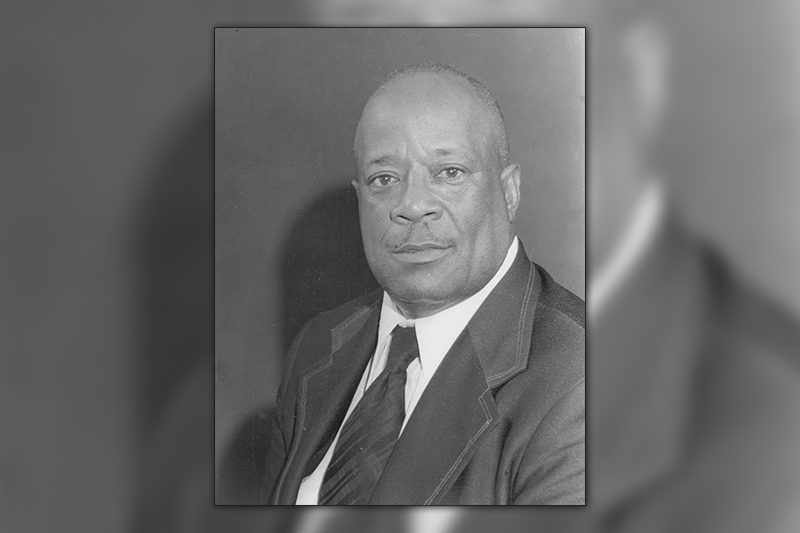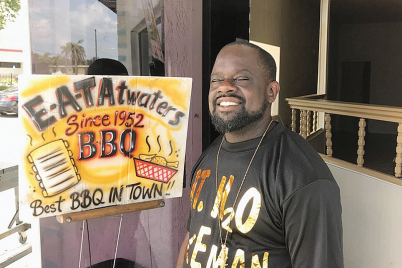Joseph E. Savage spearheaded the 1968 garbage strike in St. Pete.
By Gwendolyn Reese
Joseph E. Savage, a sanitation worker, spearheaded a movement leading 211-300 of his fellow workers to walk off their jobs in May 1968. This was just a little more than a month after the assassination of Dr. Martin Luther King, Jr. in Memphis on April 4, 1968.
Dr. King was in Memphis to support and bring attention to a strike by more than 1,300 of the city’s sanitation workers. Dr. King’s brother, A.D. King, came to St. Petersburg in support of the workers here as did Rev. Ralph D. Abernathy, former president of the Southern Christian Leadership Conference (SCLC). The SCLC is an African-American civil rights organization established in 1957 in Atlanta. Dr. King served as its first president.
According to an article in St. Petersburg Times dated January 1968, Savage said the workers had several strikes and work stoppages before the strike in May 1968. During that time, several workers met at Savage’s home and organized the Young Men’s Progressive Club. The purpose of the club was to work towards upgrading wages and working conditions of the sanitation workers.
The strike was not planned but was the result of broken promises. Sanitation workers developed a plan to save the city money with the intent that the workers would benefit from the savings. The plan saved the city close to $300,000, but city officials were only giving the workers five cents an hour more.
In protest, some of the younger workers used a garbage truck to block the entrance thus igniting the strike that lasted nearly four months. The community supported the workers and raised money for the striker’s families, fed them and raised money to bail them out of jail. Lynn Andrews, the city manager, fired the workers and advertised in several states for workers to replace them.
The strike for better pay and working conditions lasted 116 days during which racial tensions exploded in various ways. Savage received death threats, his car was burned in front of his home, and his telephone was tapped.
Additionally, there was street violence and fire bombings resulting in property damage for both white and black residents. In mid-August, the city’s black neighborhoods suffered through four days of arson, gunshots and rock and bottle throwing.
Police in riot gear walked the streets, an armored anti-riot tank was used to shoot tear gas, and hundreds of young blacks were arrested. A civil emergency was declared. Savage was arrested, and there is a picture in the May 1988 edition of the Times of the arrest showing Savage laughing while being physically carried away by two policemen.
He was quoted as saying: “I was laughing to keep from crying.” According to his son Abdul Karim Ali, “His wife Beulah Savage was the backbone of the family while he was leading the strike.”
Upon returning to work, the men had to work a six-day week including a half-day on Saturday; they were paid for a full day, but they lost their seniority, sick leave and vacation benefits. Savage and James B. Sanderlin, who was legal counsel for the workers, found the settlement to be unsatisfactory, but the men decided to accept the terms because they could not afford to continue striking after four months.
More importantly, however, the strike is seen as a milestone in local civil rights history. The black community united over the issue and learned how to negotiate with the city. The city council passed a law allowing the workers to form a union that was established in 1970, and the Community Alliance was born.
The following year, C. Bette Wimbish, the first black council member would be elected. A few years later Sanderlin, the young lawyer who represented the striking workers, would be elected the first black judge in Pinellas County.
The man, Joseph E. Savage, was much more than a sanitation worker. He was more than a man of courage who despite his fears during the strike never gave up. He was a man concerned about his community; a man willing to take a stand for himself and others.
He was a church-going man and a singer widely known throughout Tampa Bay. He was a deacon, president of the male chorus, a member of the gospel chorus and vice-president of the No. 1 choir at Galilee Missionary Baptist Church.
He is quoted as saying, “I was raised up in the church. I’m not saying I’ve been right all the time. I have my faults like anyone else, but I tried to live a Christian life.”
Savage retired from the sanitation department in 1987 after 37 years. He died at the age of 75 in January 2001. In 2006, the city honored Savage by naming its sanitation headquarters at 2001 28th St. N, the Joseph E. Savage Complex. The man known for smoking cigars probably never considered himself a hero, but there are many people in this city who do.
Sources:
Tampa Tribune May 9, 1993
St. Petersburg Times, Neighborhood Times April 19, 2006, January 25, 1988, and January 18, 2001
National SCLC website









